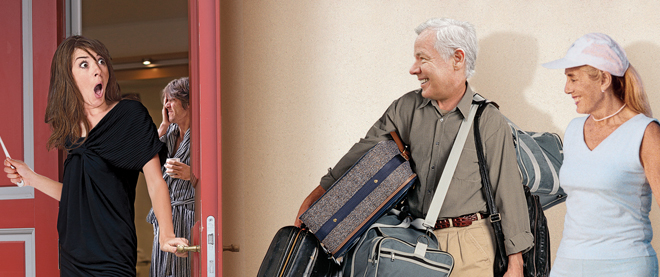How to be the perfect host
Make guests feel welcome, sure, but don’t forget a little downtime for yourself
Share

Hosting overnight guests may feel like it’s on the stress scale somewhere between marriage and imprisonment, but with a little planning any visit can run smoothly, promises Kathy Bertone.
She knows what it’s like to host a steady stream of out-of-town visitors. A former partner in a mergers and acquisitions firm, she has entertained guests at her homes in Naples, Fla., the mountains of West Virginia, and a small town outside Washington.
Step one is to confirm the exact dates of the visit. “Although one assumes this is a no-brainer, you would be surprised at how many people have told me horror stories about the guests who you thought were coming for three days and stayed for eight,” she writes in The Art of the Visit: Being the Perfect Host, Becoming the Perfect Guest.
Also, plan an itinerary and send it in advance. This allows you to schedule downtime for yourself and let people know who is expected to pay for what. “So many hosts get flustered as to who pays.” And no, the answer is not the one who can better afford it, she writes. “When making your list, you might say, ‘Friday, 7 p.m., dinner at Chez François. My treat.’ Or, ‘Saturday fishing trip for those who want to participate. $75 per person paid to the captain upon arrival to the boat.’ ”
Inquire by email about guests’ dietary preferences—who’s vegetarian, who’s lactose intolerant—and plan meals accordingly. Friends who have specific food preferences, such as blue agave syrup in their coffee, should pack their own specialty items.
Don’t grocery shop the day your guests arrive. “I had this habit,” writes Bertone. “I would put off running around until the morning of my guests’ arrival. Not smart. Causes stress level to reach Defcon 1.” She tells the story of visiting a frazzled friend who greeted her at the door clutching a butcher’s knife with sweat beaded on her brow. Later, after a few drinks, the frazzled friend confessed that she was so behind schedule, she was hoping Bertone would get caught in traffic and not show up on time.
“Whenever people arrive at your home, there can be a brief moment of tension,” warns Bertone. “That moment can seem like an eternity with people you don’t know very well.” Greet guests heartily with a hug or a handshake. Have drinks and snacks ready to offer. If you own a dog, put it behind closed doors. “There is nothing as distracting as trying to greet your guest with a dog barking or running about.” Introduce the dog when the guests are settled in.
For early risers, leave the coffee maker in plain view with instructions on sticky notes. “Unless you know your guest will eat you out of house and home or drink beer all day long, show them around the kitchen, letting them know to help themselves. I used to wait on guests hand and foot. I no longer practise this masochistic ritual. If they want a gin and tonic, they know where the refrigerator and liquor cabinet are located.”
Expect transgressions. “Your guests will insult you, either intentionally or not. Your neighbourhood will not be as pretty as theirs or your kitchen as state-of-the-art. Take it in stride and change the subject.” If guests start arguing, or worse, yelling, “it is absolutely your privilege to tell folks you don’t want to discuss that in your home. Don’t be intimidated.” Bertone points out that for some “unknown psychological reason, some couples wait to discuss those things they dislike about each other until they are in the presence of others. Change the topic quickly. Don’t agree or disagree or take sides.”
On days when your guests look great—“tan, and fresh from their day at the beach”—and you’re looking like a zombie—“hair not brushed; a distant look in the eye combined with a focused stare”—you need some alone time. “Go for a long walk, go read, make an excuse to run an errand. Tell an adult where you are going. If you don’t, they will come looking for you.”
Another tip: take photos at the beginning of the visit. “Things usually go quite well the first day or two,” Bertone said in an interview. “But by the end of the visit, people are tired. It’s much easier to take that perfect photo at the beginning.”